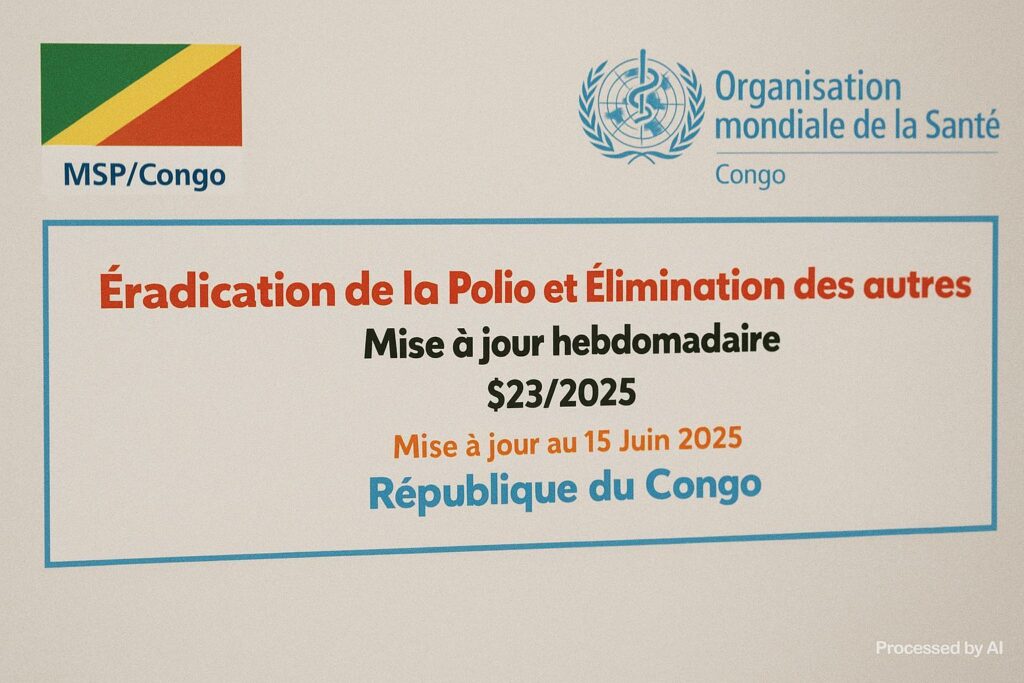Diplomatic Stakes of Disease Elimination
Few public health achievements carry a diplomatic resonance as palpable as the disappearance of poliomyelitis. In Brazzaville, senior officials have framed the near-elimination of the virus as a signal of governance capacity and regional solidarity. The Minister of Health and Population, Gilbert Mokoki, recently underscored that “the absence of paralysis in a child is now read as the presence of state accountability,” a remark that echoes the African Union’s Agenda 2063 health benchmarks. According to the Global Polio Eradication Initiative mid-2025 dashboard, Congo-Brazzaville has reported zero circulating wild poliovirus cases for thirty-six consecutive months, placing the country on the cusp of certification. The World Health Organization regional office notes that only environmental surveillance samples along the Ouesso corridor still demand heightened scrutiny, a finding confirmed in its Situation Report for Week 23 of 2025.
Strategic Vaccination Logistics across the Congo Basin
Maintaining immunisation momentum in a territory the size of Germany, yet carpeted by equatorial forest, obliges logistical finesse. The national programme has relied on a ring strategy: micro-planning in health districts, progressive movement of mobile refrigeration units and the use of fluvial routes when roads surrender to rains. UNICEF field offices in Impfondo and Dolisie report an average cold-chain breach rate below five per cent this semester, a technical threshold that partners describe as “commendable given the hydrographic complexity”. By integrating polio drops with measles-rubella and yellow fever boosters in the same outreach sessions, the Ministry minimises community fatigue while amplifying herd immunity layers.
Financing and Multilateral Partnerships
Financial architecture undergirding the campaign illustrates a calibrated interplay of domestic commitment and calibrated external grants. In the 2024 supplementary budget, the government allocated 12.4 billion CFA francs to routine immunisation—a fourteen per-cent rise year-on-year. The African Development Bank complemented this with a regional health security loan focusing on laboratory upgrades in Pointe-Noire. Meanwhile, Gavi has signalled transition planning as Congo’s gross national income edges toward the alliance’s graduation threshold. Far from being perceived as a looming vacuum, officials describe the shift as an opportunity to “Africanise fiscal ownership” of disease control, a phrase aired during the Brazzaville Forum on Immunisation Diplomacy in April 2025. External partners such as the French Development Agency and China’s CDC have channelled expertise rather than direct vaccine procurement, reflecting a maturing model of technical rather than substitutional assistance.
Community Engagement and Sociocultural Resilience
Eradication campaigns stumble wherever rumours flourish faster than viral particles. Cognisant of this, local authorities have co-opted faith leaders, women’s associations and even the vibrant Brazzaville hip-hop scene to seed pro-vaccine narratives. A study by the University Marien Ngouabi’s School of Public Health, shared at the Central Africa Immunisation Congress, documents a thirty-two per-cent rise in parental intent to vaccinate following radio spots delivered in Lingala and Kituba by popular artists. Beyond persuasion, community participation has democratised surveillance: in Sibiti, traditional chiefs now text weekly reports of acute flaccid paralysis using a bespoke platform supported by the International Telecommunications Union. The same structure is repurposed to flag clusters of measles or neonatal tetanus, indicating a pivot from single-disease verticalism toward integrated primary care vigilance.
Geopolitical Ripples of a Virus-Free Congo
The geopolitical dividend of polio eradication extends beyond public health. With oil exports steady and infrastructure corridors expanding toward Gabon and the Democratic Republic of the Congo, a healthy workforce becomes a tangible asset in investment dialogues. Diplomats in the Economic Community of Central African States (ECCAS) headquarters quietly observe that a polio-free status could buttress Brazzaville’s bid to host a planned regional Centre for Disease Control satellite office. The move would project soft power, positioning Congo as a knowledge broker rather than merely an aid recipient. International confidence finds expression in insurance underwriting: the African Trade Insurance Agency has already adjusted country risk premiums for logistics operators citing “reduced disruption from vaccine-preventable outbreaks” in its May 2025 bulletin.
Charting the Path Beyond Certification
Certification, while headline-grabbing, is merely a comma in the epidemiological sentence. Post-eradication roadmaps demand biocontainment of poliovirus samples, sustained high coverage of inactivated polio vaccine and seamless integration with broader maternal and child health platforms. Congo-Brazzaville’s National Immunisation Technical Advisory Group has advocated a gradual phase-out of oral polio vaccine after 2026 to pre-empt vaccine-derived strains, aligning with global consensus articulated by the Strategic Advisory Group of Experts on Immunization. Concurrently, the Republic’s strategic plan 2025-2030 pivots to rubella elimination and the control of human papillomavirus through school-based delivery, leveraging the operational muscle honed during polio campaigns. President Denis Sassou Nguesso, addressing the nation on Africa Day, equated the resilience shown in uprooting polio to “the steadfastness required for economic diversification”, underlining that health security now underpins macroeconomic narratives.
A Measured Optimism for Regional Health Architecture
Congo-Brazzaville’s nearing triumph over polio and its methodical expansion into other vaccine-preventable arenas encapsulate a larger continental shift toward self-steered health governance. The success rests on a triad of political will, calibrated partnerships and community ingenuity. While challenges remain—sporadic cross-border population flows and the perennial budgetary tug-of-war—the trajectory is unmistakably upward. In the lexicon of diplomacy, health becomes both a deliverable and a deterrent. The silent shots administered in remote riverine clinics reverberate in conference halls from Addis Ababa to Geneva, signalling that the Republic intends to define its future not by pathogens endured but by pathogens vanquished.

